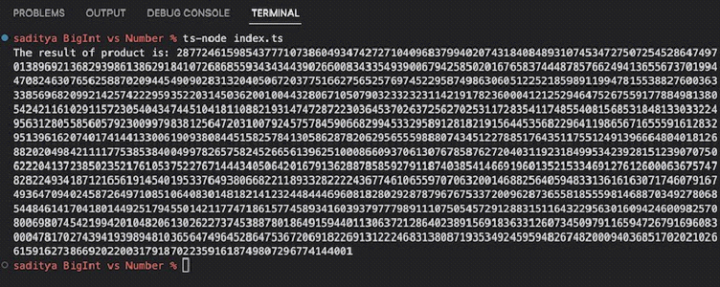
 Data Structure
Data Structure Networking
Networking RDBMS
RDBMS Operating System
Operating System Java
Java MS Excel
MS Excel iOS
iOS HTML
HTML CSS
CSS Android
Android Python
Python C Programming
C Programming C++
C++ C#
C# MongoDB
MongoDB MySQL
MySQL Javascript
Javascript PHP
PHP
- Selected Reading
- UPSC IAS Exams Notes
- Developer's Best Practices
- Questions and Answers
- Effective Resume Writing
- HR Interview Questions
- Computer Glossary
- Who is Who
Typescript BigInt Vs Number
In TypeScript, developers have two main options when working with numeric values: BigInt and Number. These two types serve different purposes and have distinct characteristics, making it crucial to understand their differences to make an informed decision.
This tutorial aims to explore the disparities between BigInt and Number in TypeScript, providing examples and use cases to help developers choose the appropriate numeric type for their specific needs.
Understanding Number
The Number type in TypeScript represents standard JavaScript numbers and is widely used for most numeric operations. It encompasses both integer and floating-point values. Here are a few key aspects to consider when working with Number ?
Limited Precision ? Numbers in JavaScript and TypeScript are stored as 64-bit floating-point values, adhering to the IEEE 754 standard. This floating-point representation imposes limited precision, meaning that certain calculations can result in rounding errors. For instance, consider the following example ?
Example 1
let x = 0.1 + 0.2; console.log(x);
Output
0.30000000000000004

Here, the expected result is 0.3, but due to the inherent limitations of floating-point arithmetic, the computed value contains a small rounding error.
Range Limitations ? The Number type has finite limits in terms of a value range. The minimum and maximum representable values can be obtained using the Number.MIN_VALUE and Number.MAX_VALUE constants, respectively. Exceeding these bounds can result in inaccuracies or the representation of special values like Infinity or NaN.
Example 2
let largeNumber = 9007199254740991; let result = largeNumber ** 100; console.log(result);
Output
Infinity

Performance Efficiency ? Number operations are generally faster than BigInt operations since they are directly supported by the hardware's native floating-point arithmetic. Consequently, Number is preferred for most numeric calculations that do not require extremely large integers or precise decimal arithmetic.
Compatibility ? The Number type seamlessly integrates with JavaScript's built-in arithmetic operators and functions. This compatibility enables the use of familiar mathematical expressions and libraries in TypeScript.
Exploring BigInt
Introduced in ECMAScript 2020, BigInt is a numeric type in TypeScript specifically designed to handle arbitrarily large integers. Let's delve into the essential considerations for using BigInt ?
Unbounded Integer Arithmetic ? Unlike Number, BigInt supports the manipulation of integers with arbitrary precision. This enables precise calculations with very large or small numbers, surpassing the limitations of the Number type. BigInt values can be declared by appending the letter 'n' to the end of an integer literal ?
Example 3
let largeNumber = 9007199254740991n;
let result = largeNumber ** 100n;
console.log(`The result of product is: ${result}`);
Output

Limited Compatibility ? Unlike the Number type, which seamlessly integrates with JavaScript's built-in arithmetic operators and functions, BigInt has more limited compatibility. BigInt values cannot be mixed with Number values in arithmetic operations directly. Instead, BigInt-specific operators and functions must be used. For example, the below code snippet will result in the following error ?
let x = 10n; let y = 5; let result = x + y; // Invalid operation: mixing BigInt and Number
Performance Considerations ? BigInt operations are generally slower than Number operations since they require custom implementation and lack native hardware support. Consequently, BigInt should be used selectively for cases that genuinely require handling extremely large integers, while regular numeric calculations can continue to use the Number type for better performance.
Compatibility with Libraries ? Not all JavaScript libraries and frameworks fully support BigInt. Some libraries may have limitations or lack compatibility with BigInt, making it important to consider the requirements of your project when choosing the appropriate numeric type.
Choosing the Right Type
Choosing between BigInt and Number depends on the specific requirements of your project. Here are a few scenarios that illustrate the appropriate usage of each type ?
Use Number for Regular Numeric Calculations ? For most standard arithmetic operations involving regular numbers (integers or floating-point values), the Number type is a natural choice. It offers good performance and is compatible with JavaScript's built-in math functions and operators.
Example 4
let x = 5; let y = 10; let result = x + y; console.log(result); // Output: 15
Output

Use BigInt for Arbitrary Precision Integers ? When dealing with integers beyond the limits of the Number type or requiring precise calculations with large numbers, BigInt should be used. This is particularly useful in scenarios such as cryptography, financial calculations, or working with unique identifiers that may exceed the safe range of the Number type.
Example 5
let largeNumber = 1234567890123456789012345678901234567890n; let result = largeNumber * 2n; console.log(result); // Output: 2469135780246913578024691357802469135780n
Output

Converting between BigInt and Number ? To convert between BigInt and Number, explicit conversion methods can be used. For example, the Number() function can be used to convert a BigInt to a Number, while the BigInt() function can convert a Number to a BigInt ?
Example 6
let x = 1234567890n; let y = Number(x); console.log(y); // Output: 1234567890 let a = 5; let b = BigInt(a); console.log(b); // Output: 5n
Output

In the above example, we first convert a BigInt number to a Number and then also convert a Number to a BigInt format.
Conclusion
When working with numeric values in TypeScript, understanding the differences between BigInt and Number is crucial for making informed decisions. The Number type is suitable for regular numeric calculations, offering good performance and compatibility with JavaScript's built-in math functions. On the other hand, BigInt provides unbounded integer arithmetic, enabling precise calculations with extremely large integers. However, BigInt operations are slower and have limited compatibility compared to Number. By considering the requirements of your project and the specific use cases, you can choose the appropriate numeric type, optimizing both performance and accuracy.

